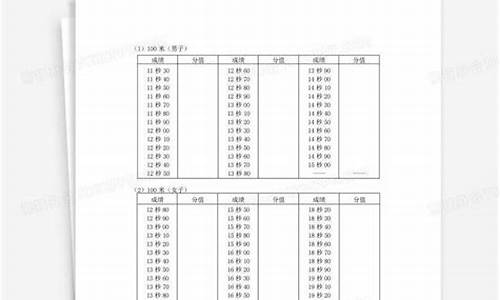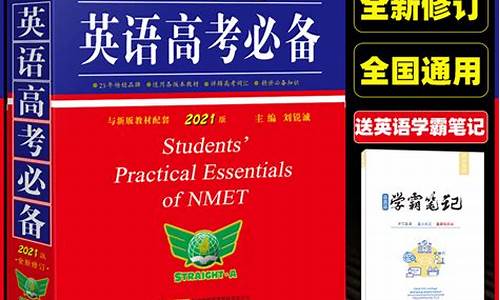高中动词考点_高考动词教案
1.拜托英语好的同学 高考非谓语动词做题的技巧和步骤是什么?
2.高考怎么考动词
3.高考英语口语:常用的情感类动词三篇
4.2020年高考英语常用动词大全
5.高考英语语法:高考英语总复习语法专项 情态动词
6.公开课中如何把情态动词与高考考点结合起来

南开中学 李士明
非谓语动词做定语
直接修饰名词的成分称为定语,一般由形容词或名词担当,也可以分别由不定式、分词或动名词等非谓语动词来担当。那么如何区别并正确使用非谓语动词呢?
NON-FINITES
1. 现在分词与过去分词的区别
我们知道非谓语动词都源于及物和不及物两种谓语动词,要了解现在分词与过去分词的区别就要从谓语动词的基本属性开始。
1)及物动词 (v.t.)
及物动词的主语我们称为动作的发出者(sender),宾语称为动作的承受者(receiver)。
例如:
The news surprised
动词+ing (发出者) 及物动词v.t.
the students.
动词+ed (承受者)
Surprise是及物动词, 在使用surprise这个动词的非谓语分词形式时,修饰动作发出者news用现在分词形式(动词+ing),修饰动作的承受者用过去分词形式(动词+ed)。
●They are talking about the surprising news. (surprising做定语修饰发出者news)
The news is surprising. (surprising做表语修饰发出者news)
They are talking about the surprised students. (surprised做定语修饰承受者students)
The students are surprised. (surprised做表语修饰承受者students)
再来看几个例子:
●exciting games激烈精彩的比赛, excited spectators激情振奋的观众
●disappointing results令人沮丧的结果, disappointed people大失所望的人们
●exhausting work令人疲惫不堪的工作, exhausted workers筋疲力尽的工人
●moving stories感人肺腑的故事, moved students感激涕零的学生
从以上例子可见,现在分词和过去分词都可以用作形容词来修饰名词,修饰动作发出者用现在分词,修饰动作承受者用过去分词。要特别注意的是,依据被修饰的名词是人还是物来判断现在分词和过去分词的用法是不准确的。
例如: They complicated the situation by introducing some more restriction.
他们采用了一些更多的限制把形势复杂化了。
及物动词complicate的发出者是人they, 而承受者是物。因此,“复杂恶化的形势”应译为the complicated situation,“形势是令人棘手的” 应译为The situation is complicated.
从这个例子可以清楚地看出,如果根据中文,很容易将“令人棘手的形势”错误地理解为 “complicating situation”。
再比如我们常用的:
a broken cup 一个破杯子; spoken English英语口语;exported products出口产品。
因此,准确了解所修饰的名词与及物动词的关系,是正确使用及物动词的现在分词和过去分词的关键。
2) 不及物动词(v.i.)
不及物动词只有动作的发出者,不存在动作的承受者。因此,不及物动词的现在分词源于进行时,表示动作正在进行,而过去分词则源于完成时,表示动作已完成。
例如:
●He looked at the leaves which are falling in the air.(从句用进行时修饰名词the leaves)
他看着空气中飘然下落的叶子。
=He looked at the leaves falling in the air.(现在分词短语修饰名词the leaves表示进行)
=He looked at the falling leaves in the air. (现在分词修饰名词the leaves表示进行)
●He walked on the leaves which had fallen on the ground.(从句用完成时修饰名词the leaves) 他走在地面的落叶上。
He walked on the leaves fallen on the ground.(过去分词短语修饰名词leaves表示过去)
He walked on the fallen leaves on the ground. (过去分词修饰名词leaves表示过去)
●the rising sun. = the sun that is rising. 冉冉升起的太阳
the risen sun = the sun that has risen. 已经升在天空的太阳
●boiling water = water which is boiling. 沸腾的水
boiled water = water which has boiled 开过的水
2. 不同形式不定式做定语的区别
动词不定式的一般式可以用做形容词,担当名词的定语, 表示将要发生的动作,不定式的进行式和完成式都不可以用作定语。
1)及物动词不定式一般式主动to do sth和被动to be done 两种形式的区别。
例如:
●Have you anything to send? = Have you anything that you will send?
你有什么东西要(自己)寄吗?(主动含义,动作由you自己去完成)
(to send做定语, 源于定语从句that you will send, 修饰先行词anything, 表示将来。)
●Have you anything to be sent (by others)?=Have you anything that will be sent(by others)?
你有什么东西要(我或别人)寄吗?(被动含义,动作由他人others去完成)
(to be sent做定语, 源于定语从句that will be sent, 修饰先行词anything, 表示将来。)
从以上两个例子可以看出,不定式的主动形式to send来源于主动语态的定语从句。
而不定式的被动形式to be sent来源于被动语态的定语从句, 不能错误地认为to send 是主动形式表示被动,准确地讲应该牢记主动形式的不定式源于主动语态的从句,被动形式的不定式则源于被动语态的从句,两者绝不可以混淆。
●I have some books for you to read. = I have some books that you should read.
我有几本书希望你读一读。
(for you to read做定语, 源于定语从句that you should read, 修饰先行词books, 表示将来。原从句的主语you在不定式的前面以for you 的形式出现,担当不定式的逻辑主语。)
2)不及物动词不定式一般式做定语
当不及物动词做定语时, 后面必须有相应的介词与前面所修饰的名词相呼应, 从汉语角度理解,而忽略了必要的介词是不及物动词做定语时常见的错误。
例如:
●He is looking for a room to live in.= He is looking for a room which he will live in.
他现在正在找房间住。
(to live in做定语, 源于定语从句which he will live in, 修饰先行词room, 表示将来。)
●Would you like to have another pen to write with? ( to write with the pen)
你需要再准备一支笔用吗?
●Smith is a good man to work with. ( to work with the man)
与史密斯一起工作是再好不过了。
●Lei Feng is a brilliant example for us to learn from. ( to learn from the example)
雷锋是我们学习的光辉榜样。
●Can you lend me a chair to sit on?
您可以借给我一把椅子坐吗?
●Global Financial Crisis is a hot topic to talk about today. ( to talk about the topic)
全球性金融危机是当前人们谈论的热点话题。
拜托英语好的同学 高考非谓语动词做题的技巧和步骤是什么?
l.动词+about\x0d\ speak/talk about 谈论 think about 思考\x0d\ care about 关心,对?有兴趣 bring about 引起,使发生\x0d\ set about 着手,开始 come about 发生\x0d\ hear about 听说 worry about 为?担心\x0d\2.动词+away\x0d\ throw away 扔掉 blow away 吹走\x0d\ carry away 拿走,使入迷 clear away 清除掉,消散\x0d\ die away 逐渐消失,减弱 pass away 去世\x0d\ wash away 冲走 take away 拿走,使消失\x0d\ put away 收拾起来,存起来 give away 背弃,泄漏,赠送\x0d\ wear away 磨掉,消耗 break away 摆脱\x0d\ send away 让走开 turn away 把?打发走\x0d\3.动词+back\x0d\ keep back 隐瞒,忍住 look back(on) 回顾\x0d\ hold back 控制住 give back 归还\x0d\ call back 回电话 take back 拿回,收回\x0d\4.动词+for \x0d\ run for 竞选 ask for 要求得到\x0d\ wait for 等候 stand for 代表,表示\x0d\ long for 渴望 hope/wish for 希望得到\x0d\ care for 关心,喜欢 beg for 乞求\x0d\ search for 查找 look for 寻找\x0d\ call for 需要,要求 hunt for 寻找\x0d\ change?for 用?换 charge?for 收费,要价\x0d\ apply for 申请 take?for 误以为?是\x0d\ seek for 寻找 come for 来拿,来取5.动词+down\x0d\ burn down 烧毁 break down 坏了,垮了,分解\x0d\ take down 记下,记录 turn down 调小,拒绝\x0d\ cut down 削减,砍倒 slow down 慢下来\x0d\ pass down 传下来 put down 记下,写下,镇压\x0d\ calm down 平静下来 bring down 使?降低,使倒下\x0d\ settle down 安家 come down 下落,传下\x0d\ tear down 拆毁,拆除\x0d\6.动词+at\x0d\ come at 向?袭击 shout at 冲(某人)嚷嚷\x0d\ run at 冲向,向?攻击 work at 干?活动(研究)\x0d\ tear at 用力撕 look at 看,注视\x0d\ stare at 凝视 glare at 怒视\x0d\ glance at 匆匆一瞥 laugh at 嘲笑\x0d\ knock at 敲(门、窗等) point at 指向\x0d\ smile at 冲(某人)笑 strike at 向?打击\x0d\ aim at 向?瞄准 shoot at 向?射击\x0d\ wonder at 惊讶 call at 拜访(地点)\x0d\7.动词+from\x0d\ differ from 与?不同 suffer from 受?苦\x0d\ hear from 收到?来信 die from 因?而死\x0d\ keep/stop/prevent?from阻止? learn from 向?学习 \x0d\ result from 由于 date from 始于?时期 \x0d\ separate?from 把?分离开 \x0d\8.动词+of\x0d\ think of 想到 dream of 梦到\x0d\ consist of 由?组成 speak of 谈到\x0d\ approve of 赞成 die of 死于\x0d\ talk of 谈到 hear of 听说\x0d\ complain of 抱怨 become of 发生?情况,怎么啦\x0d\9.动词+off\x0d\ start off 出发 set off 出发\x0d\ leave off 中断 show off 炫耀\x0d\ get off 下车 take off 脱下,起飞\x0d\ see off 送行 ring off 挂断电话\x0d\ put off 延期,推迟 come off 脱落,褪色\x0d\ cut off 切断,断绝 fall off 跌落,掉下\x0d\ keep off 避开,勿走近 go off 消失;坏了,爆炸,不喜欢\x0d\ knock?off 把?撞落 break off 打断\x0d\ pay off 还清 carry off 携走带走,赢得\x0d\ get off 脱下(衣服等) give off 散发出\x0d\ turn(switch) off 关掉\x0d\10.动词+on\x0d\ depend on 依靠 rely on 依靠\x0d\ insist on 坚持 carry on 继续,进行\x0d\ keep/go on 继续 spend?on 在?花钱\x0d\ put on 穿上,戴上,上演 call on 拜访\x0d\ move on 继续移动,往前走 live on 以?为生\x0d\ feed on 以?为生 bring on 使?发展\x0d\ take on 雇用,呈现(新面貌等) try on 试穿\x0d\ have on 穿着 pass on 传授,传递\x0d\ look on 旁观 turn(switch) on 打开\x0d\11.动词+out\x0d\ break out 爆发 point out 指出\x0d\ pick out 选出 figure out 算出,理解\x0d\ burst out 进发 bring out 阐明,使表现出\x0d\ carry out 执行,进行 help out 救助\x0d\ hold out 坚持下去 set out 出发,着手,摆放\x0d\ wear out 穿破,使?疲劳 turn out 结果是,生产,培养\x0d\ make out 理解,看清楚 come out 出版,出来\x0d\ cross out 划掉 leave out 省略,删掉\x0d\ keep out(of) 使不进入,挡住 work out 算出,想出办法等\x0d\ find out 查出,弄明白 give out 散发,分发,用完\x0d\ try out 试用,试验 look out 当心,提防\x0d\ put out 扑灭 speak out 大胆讲出\x0d\ hand out 散发 send out 发出,派遣\x0d\ run out 用完 go out 熄灭\x0d\ let out 泄漏,发出(声音),出租 die out 灭绝\x0d\12.动词十in\x0d\ give in 让步 hand in 上交\x0d\ bring in 引进,使得到收入 drop in 拜访\x0d\result in 导致 succeed in 在?获成功\x0d\ join in 参加 take in 接纳,吸收,改小\x0d\ get in 收获,进入 break in 强制进入,插话\x0d\ fill in 填写 call in 召集,来访\x0d\ cut in 插入 persist in 坚持\x0d\ look in 来访,参观\x0d\13.动词十into\x0d\ look into 研究,调查 turn into 变成\x0d\ burst into 闯入,进发 divide?into 把?分成\x0d\ change?into 把?变成 put/translate?into 把?译成\x0d\ run into碰到 send sb to/into sleep 使进入状态\x0d\14.动词+over\x0d\ turn over 翻倒,细想 think over 仔细考虑\x0d\ go over 审阅,检查,研究 look over 翻阅,检查\x0d\ get over 克服 run over 压死,看一遍\x0d\ take over 接管,接替 watch over 看守,照看\x0d\ fall over 跌倒,摔倒 roll over 翻滚\x0d\15.动词十to\x0d\ belong to 属于 object to 反对\x0d\ refer to 谈到,涉及,参阅 point to 指向\x0d\ turn to 向?求助,查阅 stick/hold/keep to 坚持,忠于\x0d\ see to 处理,料理 come to 共计,苏醒\x0d\ reply to 答复 get to 到达\x0d\ bring to 使苏醒把?比作 compare?to 与?相比;把?比作\x0d\ agree to 同意 write to 写信给\x0d\ supply?to 为?提供 lead to 导致,通向\x0d\ add to 增添 attend to 处理,专心,照料\x0d\ devote?to 贡献给\x0d\16.动词+up\x0d\ grow up 成长,长大 give up 放弃,献出\x0d\ build up 建立 set up 架起、建立\x0d\ put up 搭起,架起,安装,住宿,张贴,盖起\x0d\ do up 整理,包装,打扮 \x0d\ go up 增长,上涨get up 起床,站起 \x0d\ pick up 拾起,学会,用车,来接,收听到\x0d\ bring up 抚养,呕吐,提出 出现\x0d\ turn up 开大(音量等),出席\x0d\ stay up 挺住,熬夜\x0d\ take up 开始学,从事,占据\x0d\sit up 熬夜 eat up 吃完\x0d\ use up 用完 tear up 撕碎\x0d\ lay up 储存 make up构成,组成 编造 弥补\x0d\ cut up 切碎 join up 联结起来,参军\x0d\ end up 总结 come up 上来,长出,出现\x0d\ speed up 加快速度 throw up 呕吐\x0d\ clear up 整理,收拾,放晴 look up 查找,找出\x0d\ bum up 烧毁 catch up 赶上\x0d\ hurry up 赶快 fix up 修理,安排,装置\x0d\ keep up 保持 hold up 耽搁,使停顿\x0d\ send up 发射 ring up 打电话\x0d\ open up 开创,开辟 divide up 分配\x0d\ break up 分解\x0d\17.动词十through\x0d\ get through 通过,干完,接通电话 \x0d\ look through 翻阅,看一遍,仔细查看\x0d\ go through 审阅,检查,学习 \x0d\ put?through 接通电话 see through 识破 \x0d\ check through 核对 pull through 渡过危机,康复\x0d\18.动词+with\x0d\ deal with 处理,对付 do with 处理,需要\x0d\ meet with 遇到,遭受 talk with 同?交谈\x0d\ agree with 同意,与?一致 compare with 与?相比\x0d\ combine with 与?相联合 equip?with 以?装备\x0d\ cover?with 用?覆盖 begin with 以?开始\x0d\ end up with 以?结束 supply?with 以?供给\x0d\ provide?with 以?供给 play with 玩,玩弄\x0d\19.三词以上的短语动词\x0d\ add up to 总计 break away from 摆脱\x0d\ keep away from 避开,别靠近 do away with 废除\x0d\ look down on 轻视 look up to 仰望,尊敬\x0d\ put up with 忍受 catch up with 赶上\x0d\ keep up with 赶上 run out of 用完\x0d\ make up for 弥补 go on with 继续\x0d\ get on(along) with 和?相处 look forward to 盼望\x0d\ get close to 接近 take hold of 握住\x0d\ get out of 逃避,避免 get down to 认真开始\x0d\ set fire to 放火烧 pay attention to 注意\x0d\ take notice of 注意 set an example to 为?榜样\x0d\ do well in 在?干得好 pay a visit to 访问\x0d\take a photo of 拍?照片 take the place of 取代
高考怎么考动词
蒙
语法才几个分
舍弃
重点在完型 阅读 七选五上
单词量要多
平时多做完型(一天至少3篇)高考前3个月 一天5篇以上 每篇控制在15分钟内
每天还要空出半个小时总结单词和词组
祝你成功! 语法什么都扯淡
高考英语口语:常用的情感类动词三篇
动词考察的方面比较多。可以说学语法主要学动词。动词时态,语态,动词搭配,动词非谓语
动词短语 1. 动词不变搭配不同的副词: give away,give up give in give off
2.同一副词搭配不同的动词:turn out, bring out, figure out find out
这样的题目不要单纯记忆,最好和具体的题目结合在一起有了语境就好记忆了。
非谓语——做主语,宾语 ,定语,状语,补语,表语。就是不能做谓语。
形式3种:不定式,现在分成,过去分词。
从时态, 语态和成分来学习就容易明白。
2020年高考英语常用动词大全
#高考# 导语天高鸟飞,海阔鱼跃;考试这舞台,秀出你独特的精彩;一宿好的睡眠,精神能百倍;一颗淡定的平常心,沉着应对,努力备考,考入理想院校!以下是 为大家整理的 《高考英语口语:常用的情感类动词三篇》供您查阅。
第一篇
1. amaze:使某人吃惊;amazing:令人惊叹的;amazed:感到惊奇的
2. annoy:使某人恼怒; annoying:令人恼怒的;annoyed:感到恼怒的,生气的
3. astonish:使某人惊愕;astonishing:令人惊愕的:astonished:感到惊愕的
4. confuse:使某人困惑;confusing:令人困惑的;confused:感到困惑的
5. convince:使某人信服;convincing:令人信服的;convinced:感到信服的
6. delight:使某人高兴;delighting(delightful):令人高兴的;delighted:感到高兴的
7. depress:使人低落;depressing:令人低落(沮丧)的;depressed:感到沮丧的
8. disappoint: 使某人失望;disappointing:令人失望的;disappointed:感到失望的
9. discourage:使某人泄气;discouraging:令人泄气的;discouraged:感到泄气的
10. disgust:使人厌恶:disgusting:令人厌恶的;disgusted:感到厌恶(恶心)的
第二篇
1. embarrass:使人尴尬;embarrassing:令人尴尬的;embarrassed:感到尴尬的
2. encourage:使有勇气;encouraging:令人鼓舞的;encouraged:感到鼓舞的
3. excite:使人兴奋;exciting:令人兴奋的;excited:感到兴奋的
4. exhaust: 使人筋疲力尽;exhausting:令人筋疲力尽的;exhausted:感到筋疲力尽的
5. fright:使人惊恐;frightening:令人惊恐的;frightened:感到恐惧(害怕)的
6. frustrate:使人沮丧;frustrating:令人沮丧的;frustrated:感到沮丧的
7. inspire:使人鼓舞;inspiring:令人鼓舞的;inspired:感到鼓舞的
8. interest:使人有兴趣;interesting:令人感兴趣的;interested:感到有兴趣的
9. irritate:使人愤怒;irritating:令人愤怒的;irritated:感到愤怒的
10. move:使人感动;moving:令人感动的;moved:感动的
第三篇
1. please:使人愉快;pleasing(pleasant)令人愉快的;pleased:感到快乐的
2. puzzle:使人困惑;puzzling:让人困惑的;puzzled:感到困惑的
3. satisfy:使人满意;satisfying(satisfactory):令人满意的;satisfied:感到满意的
4. shock:使人震惊:shocking:令人震惊的;shocked:感到震惊的
5. sicken:使人恶心;sickening:令人恶心的;sickened:感到恶心的
6. surprise:使人惊讶;surprising:令人惊讶的;surprised:感到惊讶的
7. terrify:使人害怕;terrifying:令人害怕的;terrified:感到害怕的
8. tire:使人疲倦:tiring:令人疲倦的;tired:感到疲倦的
9. touch:使人触动;touching;令人触动的;touched:感到触动的
0. worry:使人担忧;worrying:令人担忧的;worried:感到担忧的
高考英语语法:高考英语总复习语法专项 情态动词
2020高考就要来临了,你准备好了吗?随着上学期末的到来,复习和高考再次成为热门话题。如何在最后一个假期逆袭,成为不少考生和家长重要事情。下面我为广大考生 总结 了些相关的复习资料!
2020年高考英语常用动词大全
一. 表示“使/让?”概念的动词
这类动词常见的有:have, let, make, get, keep, drive, send, leave, force, cause等.它们后边分别可跟不定式,分词,形容词、介词 短语 ,名词等作宾语补足语。
例如:I felt sorry to have kept you waiting for me so long.对不起,让你久等了。
The victory sent our spirits rising.胜利使得我们情绪高涨。
二. 不定式做宾补,不定式符号可以省略的动词
常见的有;see, watch, hear, observe, feel, notice, listen to, llook at等感官动词及表示使役概念的have,let,mak等。这类词在变为被动语态时,其后不定式符号 to常补出。
例如:We are made to work far into the night.我们被迫干活到深夜。注:在这种结构中,watch,have,let一般不变为被动语态。如:The boy was watched to come out。(误)
三. 不定式作宾语补足语,其后内容省略而只保留不定式符号的动词
此类动词常见的有:refuse,want,intend,oblige,mean,expect,tell,hope,like,love,plan,try, prefer,wish等。
例如:-----Why did you cause the baby cry?
-----I did n't mean to.
四. 引导宾语从句用虚拟预期的动词
这类动词在引导宾语从句时常用:should+动词原形,should可以省略,常见的有:order,demend,suggest,insist,require,advise,decide,propose等。
例如:He orderd that we should do it at once.他要求我们立即完成这项工作。
He adviced we should do more speaking practising inorder to improve ourEnglish.他建议我们要想提高英语水平应练习说。
五. 形式主动、意义被动的动词
常见的有:work,open,close,write,cut,look,teach,operate,run,keep,burn,last等。此类词的主语常为物。而且还常与表示特征、状况、行为、方式的副词well,easily,long等连用。
例如:The clothing sells well.
This kind of fruit can keep long.
六. 充当系动词的行为动词
这类动词不能单独构成动词词组,其后须带有表语(名词、形容词、副词、介词短语,不定式,V-ing,V-ed)构成系表结构,常见的有feel, sound, taste, look, smell, seem, appear, become, turn, grow, make, go, run, keep, stay, prove等。
例如:It sounded like a train that was going under my house.听起来,象有火车在楼下飞驰而过。
Keep fit,study hard and wok well.身体好,学习好,工作好。
七. 只接动名词作宾语的动词
此类动词常见的有: apprecate, adcice,suggest, compiete,finish,consider,enjoy,imagine,mind,miss,practise,keep,delay,risk,excuse,
resist,avoid,escape,admit,forgive,permit,require,prevent,pardon, allow等。
例如:I appreciate her devoting herself to the cause of education.我非常钦佩她献身 教育 的精神。
Do you mind my asking a question?我问你一个问题你不介意吧?
八. 既可接现在分词又可接过去分词作宾补的动词
此类动词常见的有:get,keep,have,leave,find,see,notice,hear等。
例如:The two cheats had the lighes burning all night long. Yesday XiaoMing had his hair cut,I hardly recognized him.
九. 构成固定短语的“短语动词”
此类动词在英语中数量较大。如:act as充当,beleve in相信,come across遇见,deal with处理,engage in从事,lead to导致,refer to提到,send for派人前往,cut in插嘴 die out灭绝,rise up起义, setoff出发,warm up暖和起来,make fun of取笑,make friends with与?交朋友,set fire on点火,date back to追溯到,get along with 与?相处,look forward to期望,run out of用光,do away with废除.
例如:We must look into the matter immediately.
我们必须马上调查此事。
The old should learn form the young and keep up with.
相关 文章 :
1. 2020高三英语所有动词固定搭配
2. 关于2020年高考英语短语的重要固定搭配短语盘点
3. 2020年最新的高考英语中的词组固定搭配分享
4. 2020年高考英语作文最新的万能模板总结
5. 高考英语高频词汇词组2020(3)
公开课中如何把情态动词与高考考点结合起来
《高考英语总复习语法专项 情态动词》由留学英语组我整理(www.liuxue86.com)。本内容整理时间为05月12日,如有任何问题请联系我们。
高考英语总复习语法专项 情态动词
2009-03-18 11:48 来源:互联网 作者:佚名 [打印] [评论]
情态动词有一定的词义, 表示某种感情或语气, 是不完全动词, 不能单独作谓语, 需和实义动词一起构成谓语. 常见的情态动词有: can / could, may / might, must, shall / should, will / would, need, ought to, dare / dared等
一.may / might的用法:
1.表示?可以?, 即表示说话人许可或请求许可
a. You may take it away.
b. May I come in ?
2.表示?可能, 也许? (在疑问句中通常不用may / might, 而用likely, do you think, can等表示?是否可能, 会不会?的意思)
a. He may come today.
b. Is it likely to rain ?
c. Do you think the train will be late ?
d. Can the news be true ?这消息会是真的吗?
3.在提建议时, 可用May I
a. May I carry your bag ?
b. May I make a suggestion ?
二.can / could的用法:
1.表示许可或请求许可, 相当于may. 但can比may用得更广泛. can不仅表示说话人同意, 准许, 还可以表示客观条件许可. may通常只表示说话人同意或准许
a. The class is over. You can go home now.
b. You can go there tomorrow.
c. Can I borrow your car for today ?
2.在提建议时, 可用Can I / you
a. Can I buy you a drink ?
3.表示?会, 能?, 相当于be able to
a. He can speak English.
b. Can you play tennis ?
c. Little Tom can?t move the big box.
4.在疑问句中表示怀疑, 不确定或不会有的情况, 即?否定的推测?
a. Can it be true ? 这是真的吗?
b. Can it be true that he has passed the exam ? 他真的通过考试了吗?
5.can?t / couldn?t在陈述句中可表示?肯定不, 一定不?的意思
a. He can?t be in the room right now.
b. It can?t have rained last night, for the ground is dry.
6.can?t / couldn?t help doing sth表示?不得不,忍不住做某事?
a. People couldn?t help laughing at the foolish emperor.
7.can / be able to do的区别:
①.be able to可用于各种时态, 而can只有现在时can和过去时could
②.be able to可以和另一个不完全动词连用, 如should be able to (应该能够), must be able to (必须能够)等, 而can则不可以这样用
③.强调?能力?时, 多用be able to
a. The patient was soon able to sit up and read.
④.can可用于人或其他事物作主语的句子中; be able to只用于有生命的名词或代词作主语的句子中
三.must的用法:
1.表示?必须?, 它的否定形式是need not / needn?t, 而不是must not / mustn?t, mustn?t表示禁止或不许做某事
a. You must set off at once.
b. You needn?t tell John about it.
c. You mustn?t play with fire.
2.表示?肯定是, 一定是?的推测意义; 与此对应, 表示?肯定不,一定不?用can?t, 而不用mustn?t
a. You must be very tired now.
b. If he had really been there, I must have seen him.
c. He must have gone away. We don?t see him anywhere.
3.must / have to的区别:
①.must / have to一般可以通用, 但must侧重于说话人主观上的看法, 即?说话人认为必须?; have to侧重于客观上的需要, 含有?客观上不得不?之意
a. If the person is not breathing, you must try to start his breathing.
b. You must / have to study with a teacher if you want to know how to do first aid.
②.must没有时态的变化, 一般用于表示现在或将来; have to有时态的变化, 可用于过去, 现在, 将来各种时态
a. We must study hard when we are young.
b. I think she must remain in hospital for a week.
c. We had to stay there for a whole day because of the rain.
d. We have to practise a lot if we want to speak English well.
e. The situation has changed; we will have to change our plan.
③.它们的否定式mustn?t / not have to有很大的不同: mustn?t表示?不要(做某事)?, 有禁止之意; not have to表示?不必要(做某事)?, 含有?客观上无此必要?之意
a. You mustn?t move a person if he is badly hurt.
b. You don?t have to be a doctor to do first aid.
四.would的用法:
1.表示主观意志和愿望, 即?愿意,想要?
a. Come here whenever you would.
b. He would not leave before he finished his work.
2.would do sth可以表示过去经常发生的动作, 相当于used to do sth
a. When we were children we would go swimming every summer.
b. On Sundays he would go fishing for hours when he lived in the countryside.
3.表示请求, 愿望, 语气客气, 委婉
a. I would like some tea.
b. Would you mind closing the door ?
c. Would you tell me something about your trip ?
4.表示推测, 表示?大概, 也许?的意思
a. That would be the pen you are looking for.那也许是你在找的笔吧
五.should的用法:
1.表示义务, 责任, 可译为?应当?
a. We should complete the text in time.
b. You should be so careless.
2.表示推测或推论, 可译为?可能, 应该是?
a. He should be home by now, I think.
b. He should have arrived in Nanjing by this time.
3.should / ought to的区别:
should / ought to一般可以通用. should侧重于说话人主观上的看法, 有时含有劝告, 建议的口气, 即 ?按我的想法应该如何?; ought to语气更强, 强调?有责任, 有义务做某事?或者 ?按道理应该如何?
a. ?I will start the work at once. I think you should start at once.?
b. ?I will start the work tomorrow. No. You ought to start at once.?
六.need的用法: need表示?需要?, 既可作为情态动词, 也可作实义动词
1.need作实义动词时, 注意以下用法:
①.need to do sth; ②.need sb to do sth; ③.need doing sth (主动形式表被动意义)
a. You need to remain in bed.
b. I need you to help me with the housework.
c. The garden needs watering.( =The garden needs to be watered.)
2.need作情态动词时, 多用于否定句及疑问句中, 不用于肯定句中
a. It is still early. You needn?t hurry. =You don?t need to hurry.
b. It is 11 o?clock. Need I go now? =Do I need to go now ?
3.对于用need的提问, 肯定回答用must, 否定回答用needn?t
a. Need I come? Yes, you must. / No, you needn?t.
七.dare / dared的用法: 表示 ?敢?, 既可作为情态动词, 也可作为实义动词
1.作为情态动词时, 主要用于否定句和疑问句中, 不用于肯定句中
a. Little Jane dared not go alone. =Little Jane didn?t dare to go alone.
b. Dare you go out alone at night ? =Did you dare to go out alone at night ?
2.作为实义动词时, 可用于: dare to do sth
a. Little Jane didn?t dare to go alone.
b. Did you dare to go out alone at night ?
3.should / ought to的区别:
should / ought to一般可以通用. should侧重于说话人主观上的看法, 有时含有劝告, 建议的口气, 即 ?按我的想法应该如何?; ought to语气更强, 强调?有责任, 有义务做某事?或者 ?按道理应该如何?
a. ?I will start the work at once. I think you should start at once.?
b. ?I will start the work tomorrow. No. You ought to start at once.?
六.need的用法: need表示?需要?, 既可作为情态动词, 也可作实义动词
1.need作实义动词时, 注意以下用法:
①.need to do sth; ②.need sb to do sth; ③.need doing sth (主动形式表被动意义)
a. You need to remain in bed.
b. I need you to help me with the housework.
c. The garden needs watering.( =The garden needs to be watered.)
2.need作情态动词时, 多用于否定句及疑问句中, 不用于肯定句中
a. It is still early. You needn?t hurry. =You don?t need to hurry.
b. It is 11 o?clock. Need I go now? =Do I need to go now ?
3.对于用need的提问, 肯定回答用must, 否定回答用needn?t
a. Need I come? Yes, you must. / No, you needn?t.
七.dare / dared的用法: 表示 ?敢?, 既可作为情态动词, 也可作为实义动词
1.作为情态动词时, 主要用于否定句和疑问句中, 不用于肯定句中
a. Little Jane dared not go alone. =Little Jane didn?t dare to go alone.
b. Dare you go out alone at night ? =Did you dare to go out alone at night ?
2.作为实义动词时, 可用于: dare to do sth
a. Little Jane didn?t dare to go alone.
b. Did you dare to go out alone at night ? 《高考英语总复习语法专项 情态动词》由留学英语组我整理(www.liuxue86.com)
此公开课中,将情态动词与高考考点结合起来,可以采取以下方法:
1、明确考点:首先,需要明确情态动词在高考中的考点,例如情态动词的用法、形式、意义等。在讲解情态动词时,可以结合高考真题进行举例和讲解,让学生了解情态动词在高考中的重要性和实际应用。
2、总结归纳:在讲解完情态动词的用法后,可以进行总结归纳,帮助学生更好地掌握情态动词的用法和意义。可以将情态动词的用法和形式进行归纳整理,让学生进行记忆和背诵。
声明:本站所有文章资源内容,如无特殊说明或标注,均为采集网络资源。如若本站内容侵犯了原著者的合法权益,可联系本站删除。












